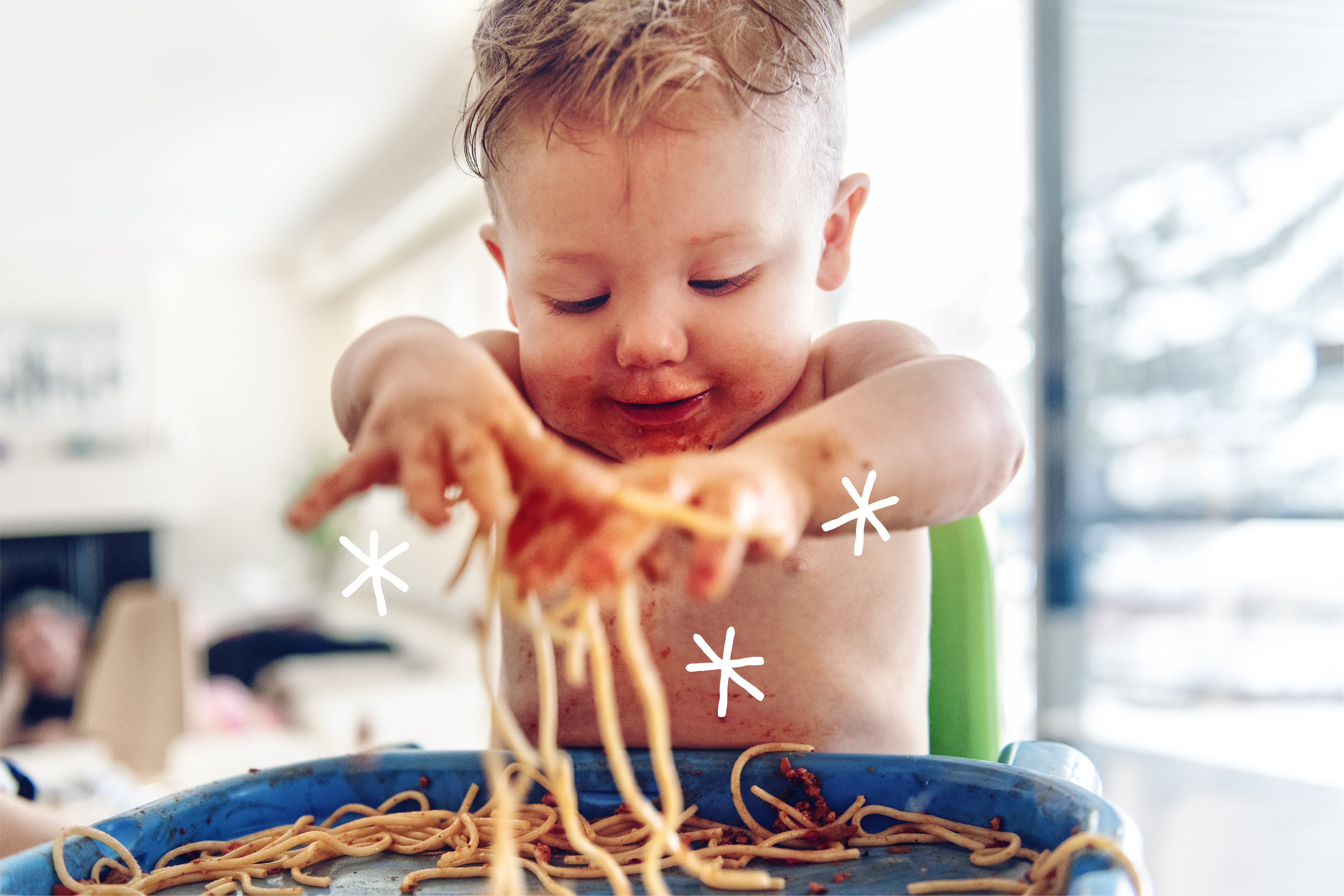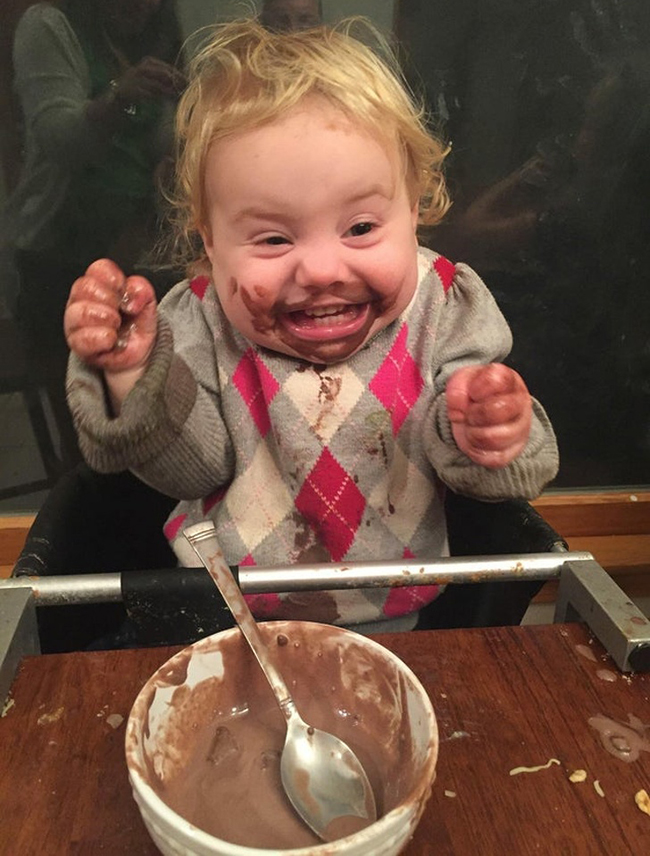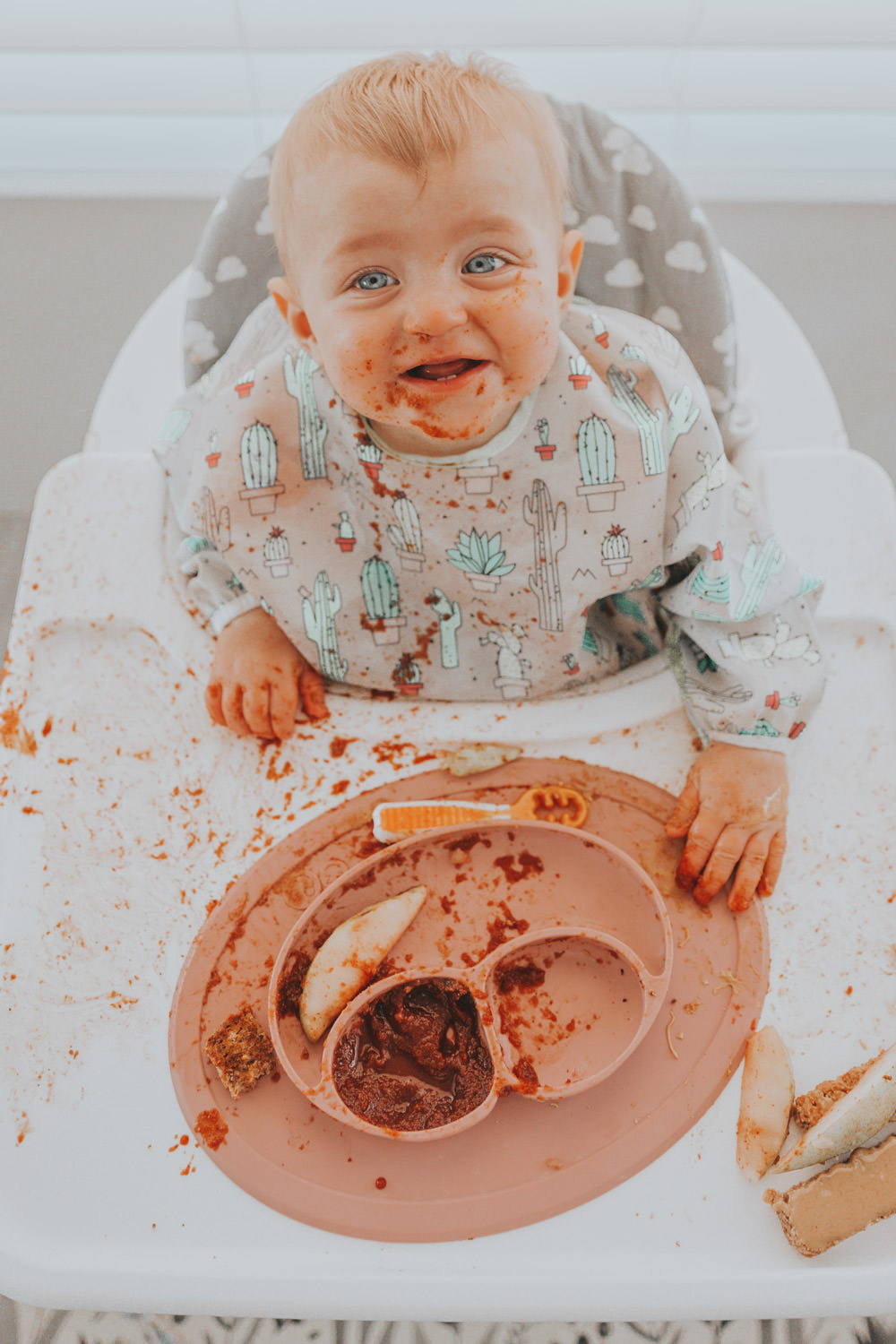![boy playing with spaghetti]()
You’re sitting down to dinner, and your baby has more of that nutritious meal on their hands than in their tummy. Should you let them play with their food, or try to rein in the sweet potato finger painting? It turns out, playing with food is a normal, healthy developmental stage for the high-chair set. But why do babies play with their food? And what are the benefits for their growing brains? Read on to find out.
1. Playing with their food helps babies learn to feed themselves
Let your child mess around with their food and eventually they’ll figure out how to get it into their mouth. By 8 to 11 months, your child may even begin to reject being spoon-fed in favor of picking up food by themselves with a pincer grasp (an important new motor skill they need to transition to finger foods). So, playing with food actually helps babies learn to eat Cheerios or peas all by themselves. They won’t be able to use a spoon on their own until about 18–24 months, but using their hands will get them there faster!
2. Playing with food may prevent picky eating
If your child is having a blast poking, squishing, and plopping their breakfast, chances are they’ll be more likely to eat and enjoy what you’re serving. That means they’ll probably be more willing to try new and unexpected foods. Getting their hands a little dirty helps them explore new textures, strong flavors, and new food combinations. (We’ve also got a whole guide on food transitions for baby!)
3. Playing with food helps babies build their brains
Babies don’t learn by listening to a lecture or reading a textbook—they learn through sensory experiences like sight, sound, touch, smell, and taste. The more your child explores food, the more they learn. Playing with food can help them learn to identify and name various foods earlier. Even behaviors that seem really challenging—dropping food on the floor or smooshing food into their hair—can teach important lessons about cause and effect.
4. Playing with food gives you a moment to catch up!
When you’re raising a baby, every moment you have to take care of your own needs is precious. Let little ones experiment and play while you sit back and enjoy your dinner! It’s a nice perk for tired, hungry parents, and it provides another benefit for baby: Watching you serve yourself and model healthy eating will give them a jump on learning good eating habits. Studies have shown that sitting down to a family meal (whenever possible) has a ton of benefits, from better grades in school to stronger self-esteem. That’s one reason we serve meals at KinderCare family-style!
We’re not saying you should always say yes to the mess. When you need things to be a little more buttoned up—at a restaurant or dining with friends—you can prevent mealtime mayhem by giving your baby foods that leave less of a mark (think plain noodles, cheese, strips of bread, scrambled eggs, or soft pieces of fruit). Keeping portions small will also help, since there’s less to smear and toss.
It’s also okay to set some boundaries. As your baby transitions into toddlerhood, you can start teaching more table manners, like saying “please” and “thank you,” sitting still, using a napkin, and not saying things like “ewwwwww” or “yuck.” But while they’re still babies, letting them play with their food can be good for both of you!
![boy playing with spaghetti]()
You’re sitting down to dinner, and your baby has more of that nutritious meal on their hands than in their tummy. Should you let them play with their food, or try to rein in the sweet potato finger painting? It turns out, playing with food is a normal, healthy developmental stage for the high-chair set. But why do babies play with their food? And what are the benefits for their growing brains? Read on to find out.
1. Playing with their food helps babies learn to feed themselves
Let your child mess around with their food and eventually they’ll figure out how to get it into their mouth. By 8 to 11 months, your child may even begin to reject being spoon-fed in favor of picking up food by themselves with a pincer grasp (an important new motor skill they need to transition to finger foods). So, playing with food actually helps babies learn to eat Cheerios or peas all by themselves. They won’t be able to use a spoon on their own until about 18–24 months, but using their hands will get them there faster!
2. Playing with food may prevent picky eating
If your child is having a blast poking, squishing, and plopping their breakfast, chances are they’ll be more likely to eat and enjoy what you’re serving. That means they’ll probably be more willing to try new and unexpected foods. Getting their hands a little dirty helps them explore new textures, strong flavors, and new food combinations. (We’ve also got a whole guide on food transitions for baby!)
3. Playing with food helps babies build their brains
Babies don’t learn by listening to a lecture or reading a textbook—they learn through sensory experiences like sight, sound, touch, smell, and taste. The more your child explores food, the more they learn. Playing with food can help them learn to identify and name various foods earlier. Even behaviors that seem really challenging—dropping food on the floor or smooshing food into their hair—can teach important lessons about cause and effect.
4. Playing with food gives you a moment to catch up!
When you’re raising a baby, every moment you have to take care of your own needs is precious. Let little ones experiment and play while you sit back and enjoy your dinner! It’s a nice perk for tired, hungry parents, and it provides another benefit for baby: Watching you serve yourself and model healthy eating will give them a jump on learning good eating habits. Studies have shown that sitting down to a family meal (whenever possible) has a ton of benefits, from better grades in school to stronger self-esteem. That’s one reason we serve meals at KinderCare family-style!
We’re not saying you should always say yes to the mess. When you need things to be a little more buttoned up—at a restaurant or dining with friends—you can prevent mealtime mayhem by giving your baby foods that leave less of a mark (think plain noodles, cheese, strips of bread, scrambled eggs, or soft pieces of fruit). Keeping portions small will also help, since there’s less to smear and toss.
It’s also okay to set some boundaries. As your baby transitions into toddlerhood, you can start teaching more table manners, like saying “please” and “thank you,” sitting still, using a napkin, and not saying things like “ewwwwww” or “yuck.” But while they’re still babies, letting them play with their food can be good for both of you!















